#Corporation for Public Broadcasting
Text
Sophie Lawton at MMFA:
Project 2025 and the right-wing think tank the Heritage Foundation have a plan for a future Republican administration to defund “woke” public media institutions, including PBS and NPR.
Last year, Project 2025, a comprehensive transition plan organized by the Heritage Foundation, released a nearly 900-page policy book titled Mandate for Leadership: A Conservative Promise. The book outlines a radical set of policy proposals that would dismantle the civil service, outlaw abortion, and roll back civil rights. (The effort is backed by over 100 conservative partner organizations and has tied itself to former President Donald Trump’s presidential campaign.)
One chapter, written by Heritage Foundation senior fellow Mike Gonzalez, lays out a plan for how a Republican administration might defund the Corporation for Public Broadcasting, which uses taxpayer dollars to help fund public media institutions like PBS and NPR.
In his chapter on public broadcasting, Gonzalez claimed “all Republican presidents have recognized that public funding of domestic broadcasts is a mistake” and “the next conservative President must” defund public media “and do it despite opposition from congressional members of his own party if necessary.”
Public broadcasting outlets like NPR and PBS are on the radical right-wing Project 2025's list to defund and eliminate.
#Project 2025#Public Broadcasting#Broadcast News Media#NPR#PBS#Mike Gonzalez#Corporation For Public Broadcasting#The Heritage Foundation
33 notes
·
View notes
Text
July 11, 2023
By Jonathan Taylor
(Los Angeles Times) — Jet-lagged and exhausted, LeVar Burton rallied his youthful energy as he exited customs at New York’s JFK airport and climbed into a waiting limo. He had just traveled from the Zambezi River in Zambia, where he had filmed a segment for the April 4, 1982, episode of ABC’s “The American Sportsman.”
The car made its way from Queens to Manhattan, dropping him off at Central Park. He was there to shoot the pilot for a new public television show aimed at encouraging early learners to love books.
The show was to be called “Reading Rainbow.”
He was not entirely sure what the job was, and certainly not aware that it would become one of his signature roles. It didn’t matter. The son of a former teacher and a passionate believer in learning, reading, exploring and growing, Burton was all-in on this new adventure.
“Everything about it just made sense,” Burton says, more than 40 years later. “It was about literature and the written word, it was about kids, it was about having kids discover the power of literature through the medium of television and that was why ‘Reading Rainbow’ was such a radical departure from other shows of its era.”
From the moment he first met the “Reading Rainbow”crew, Burton demonstrated not one iota of star attitude.
“He showed up, got out of the limo, and I said, ‘Hey, how are you?’” Cecily Truett, co-creator, head writer and producer on the show for most of its run, recalls. “He said, ‘Well, I just got off the red-eye, so…’ I said, ‘Well, what can we do for you? How can we make you comfortable?’ He said, ‘You know, I’d love to have a glass of orange juice and a toothbrush.’ And that was it.
“He walked right on to the set, he ran through his lines and for the next 25 years he was on the set, on time, with his lines memorized....”
“For 155 shows,” her husband, Larry Lancit, another of the show’s creators, producers and directors, added.
Burton had to hurry back from Africa to New York because a skeleton crew was waiting to shoot the pilot episode, including anxious documentarians Truett and Lancit and fellow creator and executive producer Twila C. Liggett, a onetime elementary school teacher who had realized TV was the ideal medium to reach and influence young children. If “Reading Rainbow” delivered on its promise that a children’s show focused on the joy and value of reading could be set in the real America rather than on Sesame Street or in Mister Rogers’ neighborhood, it would get the blessing from PBS.
It did the trick. This month marks the 40th anniversary of the national premiere of one of the longest-running children’s shows in the history of public television.
#Reading Rainbow#LeVar Burton#PBS#Corporation for Public Broadcasting#Ronald Reagan#George H.W. Bush#Bill Clinton#Los Angeles Times#huh the show was a co-production of Buffalo's and a Nebraska PBS station? did not know!#I swear too much of the programming is from WGBH or WNET - with apologies to any Bostonians and New Yorkers among you#but don't take my word for it#news
16 notes
·
View notes
Text
You want to watch Rick Steve Europe so bad don't you
14 notes
·
View notes
Text
youtube
May 1, 1969: Fred Rogers testifies before the Senate Subcommittee on Communications
Road Less Marveled
Posted on YouTube, Feb 8, 2015
On May 1, 1969, Fred Rogers, host of the (then) recently nationally syndicated children's television series, Mister Rogers' Neighborhood (named Mister Rogers' Neighborhood at the time), testified before the Senate Committee on Commerce Subcommittee on Communications to defend $20 million in federal funding proposed for the newly formed non-profit Corporation for Public Broadcasting, which was at risk of being reduced to $10 million.
Subcommittee chairman, Senator John Pastore (D-RI), unfamiliar with Fred Rogers, is initially abrasive toward him. Over the course of Rogers' 6 minutes of testimony, Pastore's demeanor gradually transitions to one of awe and admiration as Rogers speaks.
Lyrics read by Mr. Rogers in this video:
What do you do with the Mad that you Feel
What do you do with the mad that you feel
When you feel so mad you could bite?
When the whole wide world seems oh, so wrong…
And nothing you do seems very right?
What do you do? Do you punch a bag?
Do you pound some clay or some dough?
Do you round up friends for a game of tag?
Or see how fast you go?
It’s great to be able to stop
When you’ve planned a thing that’s wrong,
And be able to do something else instead
And think this song:
I can stop when I want to
Can stop when I wish
I can stop, stop, stop any time.
And what a good feeling to feel like this
And know that the feeling is really mine.
Know that there’s something deep inside
That helps us become what we can.
For a girl can be someday a woman
And a boy can be someday a man.
#fred rogers#corporation for public broadcasting#public television#mr rogers neighborhood#early childhood development#emotional control#compassion#Youtube
1 note
·
View note
Text

Gonna slide this into my presentation on thursday and see who notices
10 notes
·
View notes
Text
a failed update from billion-dollar cybersecurity firm crowdstrike has crashed windows machines worldwide today (july 19th 2024), leaving everything from airport terminals to checkout machines to delivery apps to banks stuck with a blue screen of death. here's a screenshot from downdetector (au) to illustrate:


the issue appears to be with crowdstrike falcon, a form of antivirus software widely used in the corporate world -- with emphasis on the world. there have been reports from the us, uk, australia, germany, india, france, japan and more. places affected include (but are not limited to) supermarkets, banks, basically every airline, public transport networks, major broadcasters, emergency services, corporate offices, healthcare providers and stock exchanges.
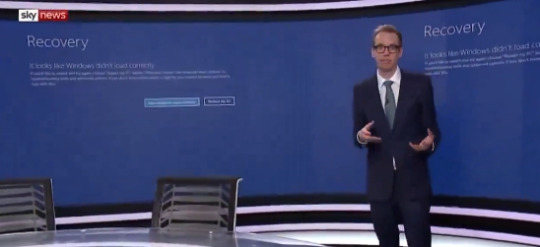
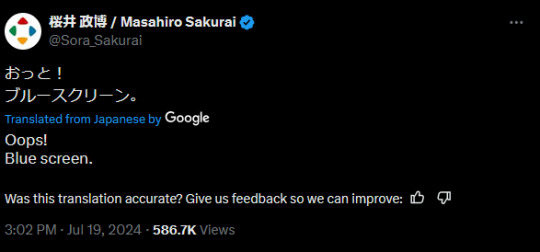




(woolies pic via archiestaines9 on twitter; s3pirion; akothari. yes that is masahiro sakurai of smash bros fame)
emergency service lines are currently experiencing problems within the american states of alaska, arizona, indiana, minnesota, new hampshire and ohio. similar problems likely plague other areas of the world, they just haven't been reported on yet. australian emergency services are operating, and critical infrastructure remains stable. be sure to check in with the local news stations still online for more updates.
welcome to y2k............................. 2!!!!!!!!!!!!!

13K notes
·
View notes
Text
Netflix wants to chop down your family tree
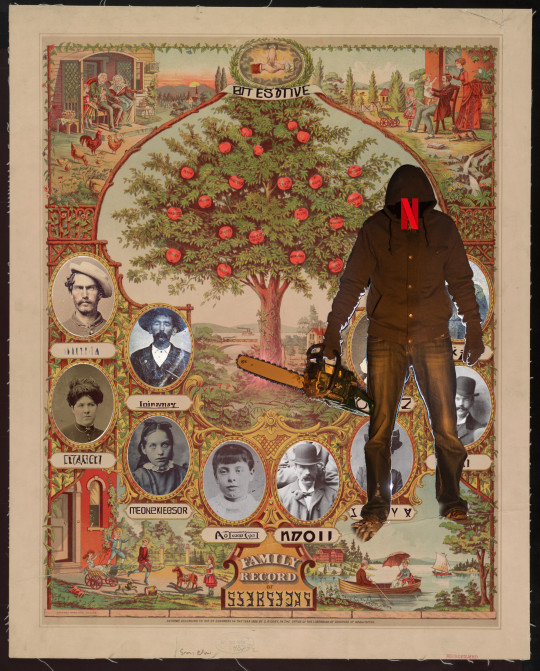
Netflix has unveiled the details of its new anti-password-sharing policy, detailing a suite of complex gymnastics that customers will be expected to undergo if their living arrangements trigger Netflix’s automated enforcement mechanisms:
https://thestreamable.com/news/confirmed-netflix-unveils-first-details-of-new-anti-password-sharing-measures
If you’d like an essay-formatted version of this post to read or share, here’s a link to it on pluralistic.net, my surveillance-free, ad-free, tracker-free blog:
https://pluralistic.net/2023/02/02/nonbinary-families/#red-envelopes
Netflix says that its new policy allows members of the same “household” to share an account. This policy comes with an assumption: that there is a commonly understood, universal meaning of “household,” and that software can determine who is and is not a member of your household.
This is a very old corporate delusion in the world of technology. In the early 2000s, I spent years trying to bring some balance to an effort at DVB, whose digital television standards are used in most of the world (but not the USA) when they rolled out CPCM, a DRM system that was supposed to limit video-sharing to a single household.
Their term of art for this was the “authorized domain”: a software-defined family unit whose borders were privately negotiated by corporate executives from media companies, broadcasters, tech and consumer electronics companies in closed-door sessions all around the world, with no public minutes or proceedings.
https://onezero.medium.com/the-internet-heist-part-iii-8561f6d5a4dc
These guys (they were nearly all guys) were proud of how much “flexibility” they’d built into their definition of “household.” For example, if you owned a houseboat, or a luxury car with seatback displays, or a summer villa in another country, the Authorized Domain would be able to figure out how to get the video onto all those screens.
But what about other kinds of families? I suggested that one of our test cases should be a family based in Manila: where the dad travels to remote provinces to do agricultural labor; the daughter is a nanny in California; and the son is doing construction work in the UAE. This suggestion was roundly rejected as an “edge case.”
Of course, this isn’t an edge case. There are orders of magnitude more people whose family looks like this than there are people whose family owns a villa in another country. Owning a houseboat or a luxury car makes you an outlier. Having an itinerant agricultural breadwinner in your family does not.
But everyone who is in the room when a cartel draws up a standard definition of what constitutes a household is almost certainly drawn from a pool that is more likely to have a summer villa than a child doing domestic work or construction labor half a world away. These weirdos, so dissimilar from the global majority, get to define the boxes that computers will shove the rest of the world into. If your family doesn’t look like their family, that’s tough: “Computer says no.”
One day at a CPCM meeting, we got to talking about the problem of “content laundering” and how the way to prevent it would be to put limits on how often someone could leave a household and join another one. No one, they argued, would ever have to change households every week.
I put my hand up and said, “What about a child whose divorced parents share custody of her? She’s absolutely going to change households every week.” They thought about it for a moment, then the rep from a giant IT company that had recently been convicted of criminal antitrust violations said, “Oh, we can solve that: we’ll give her a toll-free number to call when she gets locked out of her account.”
That was the solution they went with. If you are a child coping with the dissolution of your parents’ marriage, you will have the obligation to call up a media company every month — or more often — and explain that Mummy and Daddy don’t love each other any more, but can I please have my TV back?
I never forgot that day. I even wrote a science fiction story about it called (what else?) “Authorized Domain”:
https://craphound.com/news/2011/10/31/authorised-domain/
I think everyone understood that this was an absurd “solution,” but they had already decided that they were going to complete the seemingly straightforward business of defining a category like “household” using software, and once that train left the station, nothing was going to stop it.
This is a recurring form of techno-hubris: the idea that baseline concepts like “family” have crisp definitions and that any exceptions are outliers that would never swallow the rule. It’s such a common misstep that there’s a whole enre* called “Falsehoods Programmers Believe About ______”:
https://github.com/kdeldycke/awesome-falsehood
In that list: names, time, currency, birthdays, timezones, email addresses, national borders, nations, biometrics, gender, language, alphabets, phone numbers, addresses, systems of measurement, and, of course, families. These categories are touchstones in our everyday life, and we think we know what they mean — but then we try to define them, and the list of exceptions spirals out into a hairy, fractal infinity.
Historically, these fuzzy categorical edges didn’t matter so much, because they were usually interpreted by humans using common sense. My grandfather was born “Avrom Doctorovitch” (or at least, that’s one way to transliterate his name, which was spelled in a different alphabet, but which was also transliterating his first name from yet another alphabet). When he came to Canada as a refugee, his surname was anglicized to “Doctorow.” Other cousins are “Doctorov,” “Doctoroff,” and “Doktorovitch.”
Naturally, his first name could have been “Abraham” or “Abe,” but his first employer (a fellow Eastern European emigre) decided that was too ethnic and in sincere effort to help him fit in, he called my grandfather “Bill.” When my grandfather attained citizenship, his papers read “Abraham William Doctorow.” He went by “Abe,” “Billy,” “Bill,” “William,” “Abraham” and “Avrom.”
Practically, it didn’t matter that variations on all of these appeared on various forms of ID, contracts, and paperwork. His reparations check from the German government had a different variation from the name on the papers he used to open his bank account, but the bank still let him deposit it.
All of my relatives from his generation have more than one name. Another grandfather of mine was born “Aleksander,” and called “Sasha” by friends, but had his name changed to “Seymour” when he got to Canada. His ID was also a mismatched grab-bag of variations on that theme.
None of this mattered to him, either. Airlines would sell him tickets and border guards would stamp his passport and rental agencies would let him drive away in cars despite the minor variations on all his ID.
But after 9/11, all that changed, for everyone who had blithely trundled along with semi-matching names across their official papers and database entries. Suddenly, it was “computer says no” everywhere you turned, unless everything matched perfectly. There was a global rush for legal name-changes after 9/11 — not because people changed their names, but because people needed to perform the bureaucratic ritual necessary to have the name they’d used all along be recognized in these new, brittle, ambiguity-incinerating machines.
For important categories, ambiguity is a feature, not a bug. The fact that you can write anything on an envelope (including a direction to deliver the letter to the granny flat over the garage, not the front door) means that we don’t have to define “address” — we can leave it usefully hairy around the edges.
Once the database schema is formalized, then “address” gets defined too — the number of lines it can have, the number of characters each line can have, the kinds of characters and even words (woe betide anyone who lives in Scunthorpe).
If you have a “real” address, a “real” name, a “real” date of birth, all of this might seem distant to you. These “edge” cases — seasonal agricultural workers, refugees with randomly assigned “English” names — are very far from your experience.
That’s true — for now (but not forever). The “Shitty Technology Adoption Curve” describes the process by which abusive technologies work their way up the privilege gradient. Every bad technological idea is first rolled out on poor people, refugees, prisoners, kids, mental patients and other people who can’t push back.
Their bodies are used to sand the rough edges and sharp corners off the technology, to normalize it so that it can climb up through the social ranks, imposed on people with more and more power and influence. 20 years ago, if you ate your dinner under an always-on #CCTV, it was because you were in a supermax prison. Today, it’s because you bought a premium home surveillance system from Google, Amazon or Apple.
https://pluralistic.net/2021/07/29/impunity-corrodes/#arise-ye-prisoners
The Netflix anti-sharing tools are designed for rich people. If you travel for business and stay in the kind of hotel where the TV has its own Netflix client that you can plug your username and password into, Netflix will give you a seven-day temporary code to use.
But for the most hardcore road-warriors, Netflix has thin gruel. Unless you connect to your home wifi network every 31 days and stream a show, Netflix will lock out your devices. Once blocked, you have to “contact Netflix” (laughs in Big Tech customer service).
Why is Netflix putting the screws to its customers? It’s part of the enshittification cycle, where platform companies first allocate surpluses to their customers, luring them in and using them as bait for business customers. Once they turn up, the companies reallocate surpluses to businesses, lavishing them with low commissions and lots of revenue opportunities. And once they’re locked in, the company starts to claw back the surpluses for itself.
https://pluralistic.net/2023/01/21/potemkin-ai/#hey-guys
Remember when Netflix was in the business of mailing red envelopes full of DVDs around the country? That was allocating surpluses to users. The movie companies hated this, viewed it as theft — a proposition that was at least as valid as Netflix’s complaints about password sharing, but every pirate wants to be an admiral, and when Netflix did it to the studios, that was “progress,” but when you do it to Netflix, that’s theft.
Then, once Netflix had users locked in and migrated to the web (and later, apps), it shifted surpluses to studios, paying fat licensing fees to stream their movies and connect them to a huge audience.
Finally, once the studios were locked in, Netflix started to harvest the surplus for its shareholders: raising prices, lowering streaming rates, knocking off other studios’ best performing shows with in-house clones, etc. Users’ surpluses are also on the menu: the password “sharing” that let you define a household according to your family’s own idiosyncratic contours is unilaterally abolished in a quest to punish feckless Gen Z kids for buying avocado toast instead of their own Netflix subscriptions.
Netflix was able to ignore the studios’ outraged howls when it built a business by nonconsenually distributing their products in red envelopes. But now that Netflix has come for your family, don’t even think about giving Netfix some of what it gave to the MPAA.
As a technical matter, it’s not really that hard to modify Netflix’s app so that every stream you pull seems to come from your house, no matter where you are. But doing so would require reverse-engineering Netflix’s app, and that would violate Section 1201 of the DMCA, the CFAA, and eleventy-seven other horrible laws. Netflix’s lawyers would nuke you until the rubble bounced.
When Netflix was getting started, it could freely interoperate with the DVDs that the studios had put on the market. It could repurpose those DVDs in ways that the studios strenuously objected to. In other words, Netfix used adversarial interoperability (AKA Competitive Compatibility or ComCom) to launch its business:
https://www.eff.org/deeplinks/2019/10/adversarial-interoperability
Today, Netflix is on the vanguard of the war to abolish adversarial interop. They helped lead the charge to pervert W3C web-standards, creating a DRM video standard called EME that made it a crime to build a full-featured browser without getting permission from media companies and restricting its functionality to their specifications:
https://blog.samuelmaddock.com/posts/the-end-of-indie-web-browsers/
When they used adversarial interoperability to build a multi-billion-dollar global company using the movie studios’ products in ways the studios hated, that was progress. When you define “family” in ways that makes Netflix less money, that’s felony contempt of business model.
[Image ID: A Victorian family tree template populated by tintypes of old-timey people. In the foreground stands a menacing, chainsaw-wielding figure, his face obscured by a hoodie. The blade of the chainsaw is poised to chop down the family tree. A Netflix 'N' logo has been superimposed over the man's face.]
#pluralistic#enshittification#shitty technology adoption curve#cpcm#interoperabiltiy#comcom#adversarial interoperability#interop#netflix#family#ambiguity#digitizatio#nym wars#authorized domain#dvb#dvds#password sharing
7K notes
·
View notes
Text
Who’s Afraid of Project 2025?
Democrats run against a think-tank paper that Trump disavows. Why?
Wall Street Journal
July 29, 2024
By The Editorial Board
Americans are learning more about Kamala Harris, as Democrats rush to anoint the Vice President’s candidacy after throwing President Biden overboard. Ms. Harris wasted no time saying she’s going to run hard against a policy paper that Donald Trump has disavowed—the supposedly nefarious agenda known as Project 2025. But who’s afraid of a think-tank white paper?
“I will do everything in my power to unite the Democratic Party—and unite our nation—to defeat Donald Trump and his extreme Project 2025 agenda,” Ms. Harris tweeted shortly after President Biden dropped out. She’s picking up this ball from Mr. Biden, and her campaign website claims that Project 2025 would “strip away our freedoms” and “abolish checks and balances.”
***
Sounds terrible, but is it? The 922-page document doesn’t lack for modesty, as a wish list of policy reforms that would touch every part of government from the Justice Department to the Corporation for Public Broadcasting. The project is led by the Heritage Foundation and melds the work of some 400 scholars and analysts from an eclectic mix of center-right groups. The project is also assembling a Rolodex of those who might work in a Trump Administration.
Most of the Democratic panic-mongering has focused on the project’s aim to rein in the administrative state. That includes civil service reform that would make it easier to remove some government workers, and potentially revisiting the independent status of agencies like the Federal Trade Commission.
The latter isn’t going to happen, but getting firmer presidential control over the bureaucracy would improve accountability. The federal government has become so vast that Presidents have difficulty even knowing what is going on in the executive branch. Americans don’t want to be ruled by a permanent governing class that doesn’t answer to voters.
Some items on this menu are also standard conservative fare. The document calls for an 18% corporate tax rate (now 21%), describing that levy as “the most damaging tax” in the U.S. system that falls heavily on workers. A mountain of economic literature backs that up. The blueprint suggests tying more welfare programs with work; de-regulating health insurance markets; expanding Medicare Advantage plans that seniors like; ending sugar subsidies; revving up U.S. energy production. That all sounds good to us.
Democrats are suggesting the project would gut Social Security, though in fact it bows to Mr. Trump’s preference not to touch the retirement program, which is headed for bankruptcy without reform. No project can profess to care about the rising national debt, as Heritage does, without fixing a program that was 22% of the federal budget in 2023.
At times the paper takes no position. For example: The blueprint features competing essays on trade policy. This is a tacit admission that for all the GOP’s ideological confusion on economics, many conservatives still understand that Mr. Trump’s 10% tariff is a terrible idea.
As for the politics, Mr. Trump recently said online that he knew “nothing about Project 2025. I have no idea who is behind it.” That may be true. The chance that Mr. Trump has read any of it is remote to nil, and he doesn’t want to be tied to anyone’s ideas since he prizes maximum ideological flexibility.
The document mentions abortion nearly 200 times, but Mr. Trump wants to neutralize that issue. The project’s chief sponsor, Heritage president Kevin Roberts, also gave opponents a sword when he boasted of “a second American revolution” that would be peaceful “if the left allows it to be.” This won’t help Mr. Trump with the swing voters he needs to win re-election.
By our lights the project’s cultural overtones are also too dark and the agenda gives too little spotlight to the economic freedom and strong national defense that defined the think tank’s influence on Ronald Reagan in 1980.
***
But the left’s campaign against Project 2025 is reaching absurd decibels. You’d think Mr. Trump is a political mastermind hiding the secret plans he’ll implement with an army of shock troops marching in lockstep. If his first term is any guide, and it is the best we have, Mr. Trump will govern as a make-it-up-as-he-goes tactician rather than a strategist with a coherent policy guide. He’ll dodge and weave based on the news cycle and often based on whoever talks to him last.
Not much of the Project 2025 agenda is likely to happen, even if Republicans take the House and Senate. Democrats will block legislation with a filibuster. The bureaucracy will leak with abandon and oppose even the most minor reforms to the civil service. The press will revert to full resistance mode, and Mr. Trump’s staff will trip over their own ambitions.
Democrats know this, which is why they fear Trump II less than they claim. They’re targeting Project 2025 to distract from their own failed and unpopular policies.
#Wall Street Journal#Project 2025#trump#trump 2024#president trump#repost#ivanka#donald trump#americans first#america first#america#democrats
103 notes
·
View notes
Text
John Nichols at The Nation:
Donald Trump has made no secret of his determination to govern as a “dictator” if he regains the presidency, and that’s got his critics warning that his reelection would spell the end of democracy. But Trump and his allies are too smart to go full Kim Jong Un. Rather, the former president’s enthusiasm for the authoritarian regimes of Russia’s Vladimir Putin, Turkey’s Tayyip Erdoğan, and Hungary’s Viktor Orbán suggests the models he would build on: managing elections to benefit himself and his Republican allies; gutting public broadcasting and constraining press freedom; and undermining civil society. Trump, who famously demanded that the results of Georgia’s 2020 presidential voting be “recalculated” to give him a win, wants the trappings of democracy without the reality of electoral consequences. That’s what propaganda experts Edward Herman and Frank Brodhead once described as “demonstration elections,” in which, instead of actual contests, wins are assured for the authoritarians who control the machinery of democracy.
The outline for such a scenario emerges from a thorough reading of Project 2025’s Mandate for Leadership, which specifically proposes a Trump-friendly recalculation of the systems that sustain American democracy. The strategy for establishing an American version of Orbán’s “illiberal democracy” is not spelled out in any particular chapter of Mandate. Rather, it is woven throughout the whole of the document, with key elements appearing in the chapters on reworking the Department of Homeland Security (DHS), the Federal Communications Commission (FCC), and the Federal Election Commission (FEC). In the section on the DHS, for instance, there’s a plan to eliminate the ability of the agency that monitors election security to prevent the spread of disinformation about voting and vote counting.
How serious a threat to democracy would that pose? Think back to November 2020, when Trump was developing his Big Lie about the election he’d just lost. Trump’s false assertion that the election had been characterized by “massive improprieties and fraud” was tripped up by Chris Krebs, who served as director of the Cybersecurity and Infrastructure Security Agency (CISA) in the DHS.
The Republican appointee and his team had established a 24/7 “war room” to work with officials across the country to monitor threats to the security and integrity of the election. The operation was so meticulous that Krebs could boldly announce after the voting was finished: “America, we have confidence in the security of your vote, you should, too.” At the same time, his coordinating team declared, “The November 3rd election was the most secure in American history.” This infuriated Trump, who immediately fired the nation’s top election security official.
In Mandate’s chapter on the DHS, Ken Cuccinelli writes, “Of the utmost urgency is immediately ending CISA’s counter-mis/disinformation efforts. The federal government cannot be the arbiter of truth.” Cuccinelli previously complained that CISA “is a DHS component that the Left has weaponized to censor speech and affect elections.” As for the team that worked so successfully with Krebs to secure the 2020 election, the Project 2025 document declares that “the entirety of the CISA Cybersecurity Advisory Committee should be dismissed on Day One.” The potential impact? “It’s a way of emasculating the agency—that is, it prevents it from doing its job,” says Herb Lin, a cyber-policy and security scholar at Stanford’s Center for International Security and Cooperation.
This is just one way that Project 2025’s cabal of “experts” is scheming to thwart honest discourse about elections and democracy. A chapter on public broadcasting proposes to defund the Corporation for Public Broadcasting as part of a larger plan to upend NPR, PBS, and “other public broadcasters that benefit from CPB funding, including the even-further-to-the Left Pacifica Radio and American Public Media.” More destabilizing than the total funding cut that Project 2025 entertains is a parallel plan to end the status of NPR and Pacifica radio stations as “noncommercial education stations.” That could deny them their current channel numbers at the low end of the radio spectrum (88 to 92 FM)—a move that would open prime territory on the dial for the sort of religious programming that already claims roughly 42 percent of the airwaves that the FCC reserves for noncommercial broadcasting. And don’t imagine that the FCC would be in a position to write new rules that guard against the surrender of those airwaves to the Trump-aligned religious right.
[...]
While project 2025 seeks to rewire the FCC to favor Trump’s allies, it also wants to lock in dysfunction at the Federal Election Commission, the agency that is supposed to govern campaign spending and fundraising. Established 50 years ago, the FEC has six members—three Republicans and three Democrats—who are charged with overseeing the integrity of federal election campaigns. In recent years, however, this even partisan divide has robbed the FEC of its ability to act because, as a group of former FEC employees working with the Campaign Legal Center explained, “three Commissioners of the same party, acting in concert, can leave the agency in a state of deadlock.” As the spending by outside groups on elections “has exponentially increased, foreign nationals and governments have willfully manipulated our elections, and coordination between super PACs and candidates has become commonplace,” the former employees noted. Yet “the FEC [has] deadlocked on enforcement matters more often than not, frequently refusing to even investigate alleged violations despite overwhelming publicly available information supporting them.”
John Nichols wrote in The Nation about how Project 2025’s radical right-wing wishlist of items contains plans to wreck and subvert what is left of America’s democracy.
See Also:
The Nation: June 2024 Issue
#John Nichols#The Nation#Project 2025#Donald Trump#Authoritarianism#FCC#FEC#Federal Elections Commission#Federal Communications Commission#Corporation for Public Broadcasting#Cybersecurity and Infrastructure Security Agency#Chris Krebs
19 notes
·
View notes
Text
The End Is Near: "News" organizations using AI to create content, firing human writers
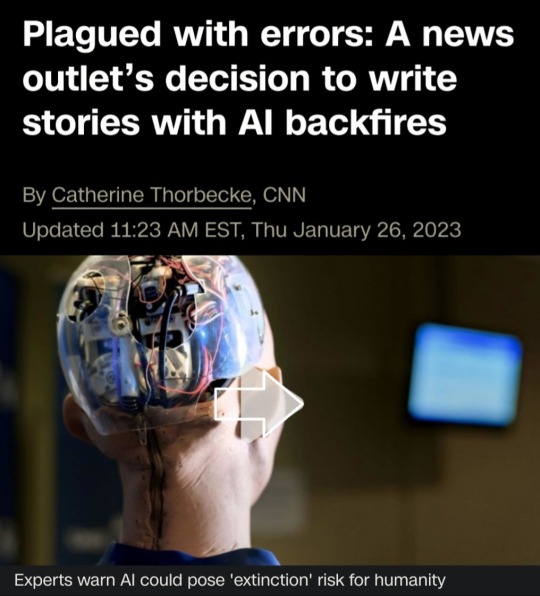
source: X
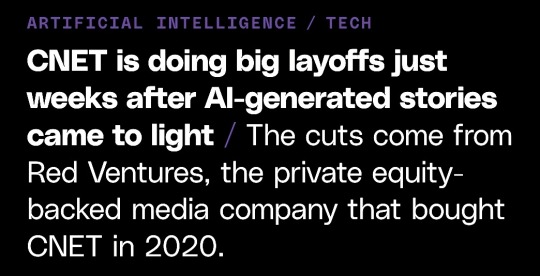
source: X
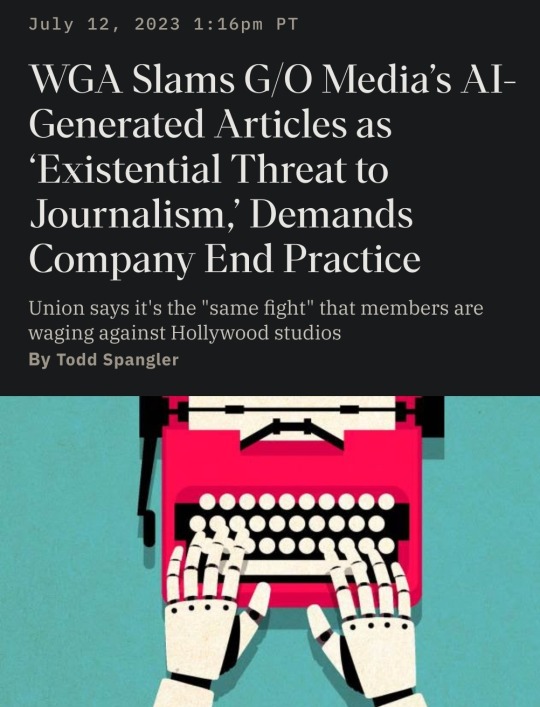
source: X
an example "story" now comes with this warning:
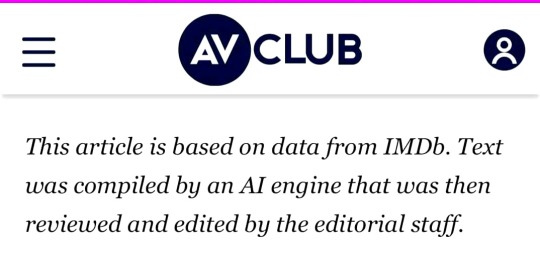
A new byline showed up Wednesday on io9: “Gizmodo Bot.” The site’s editorial staff had no input or advance notice of the new AI-generator, snuck in by parent company G/O Media.
G/O Media’s AI-generated articles are riddled with errors and outdated information, and block reader comments.
“As you may have seen today, an AI-generated article appeared on io9,” James Whitbrook, deputy editor at io9 and Gizmodo, tweeted. “I was informed approximately 10 minutes beforehand, and no one at io9 played a part in its editing or publication.”
Whitbrook sent a statement to G/O Media along with “a lengthy list of corrections.” In part, his statement said, “The article published on io9 today rejects the very standards this team holds itself to on a daily basis as critics and as reporters. It is shoddily written, it is riddled with basic errors; in closing the comments section off, it denies our readers, the lifeblood of this network, the chance to publicly hold us accountable, and to call this work exactly what it is: embarrassing, unpublishable, disrespectful of both the audience and the people who work here, and a blow to our authority and integrity.”
He continued, “It is shameful that this work has been put to our audience and to our peers in the industry as a window to G/O’s future, and it is shameful that we as a team have had to spend an egregious amount of time away from our actual work to make it clear to you the unacceptable errors made in publishing this piece.”
According to the Gizmodo Media Group Union, affiliated with WGA East, the AI effort has “been pushed by” G/O Media CEO Jim Spanfeller, recently hired editorial director Merrill Brown, and deputy editorial director Lea Goldman.
In 2019, Spanfeller and private-equity firm Great Hill Partners acquired Gizmodo Media Group (previously Gawker Media) and The Onion.
The Writers Guild of America issued a blistering condemnation of G/O Media’s use of artificial intelligence to generate content.
“These AI-generated posts are only the beginning. Such articles represent an existential threat to journalism. Our members are professionally harmed by G/O Media’s supposed ‘test’ of AI-generated articles.”
WGA added, “But this fight is not only about members in online media. This is the same fight happening in broadcast newsrooms throughout our union. This is the same fight our film, television, and streaming colleagues are waging against the Alliance of Motion Picture and Television Producers (AMPTP) in their strike.”
The union, in its statement, said it “demands an immediate end of AI-generated articles on G/O Media sites,” which include The A.V. Club, Deadspin, Gizmodo, Jalopnik, Jezebel, Kotaku, The Onion, Quartz, The Root, and The Takeout.
but wait, there's more:
Just weeks after news broke that tech site CNET was secretly using artificial intelligence to produce articles, the company is doing extensive layoffs that include several longtime employees, according to multiple people with knowledge of the situation. The layoffs total 10 percent of the public masthead.
*
Greedy corporate sleazeballs using artificial intelligence are replacing humans with cost-free machines to barf out garbage content.
This is what end-stage capitalism looks like: An ouroborus of machines feeding machines in a downward spiral, with no room for humans between the teeth of their hungry gears.
Anyone who cares about human life, let alone wants to be a writer, should be getting out the EMP tools and burning down capitalist infrastructure right now before it's too late.
652 notes
·
View notes
Text
Reading more of Project2025 and y'all...cancelling federally funded shows that are "too liberal" is on there. Like NPR & PBS
Yeah. Cancelling Sesame Street is literally part of an evil white supremacist plot to overthrow the government. I hate it as much as you do.
Page 247 of the mandate:
Defunding CPB would by no means cause NPR or PBS—or other public broadcasters that benefit from CPB funding, including the even-further-to-the Left Pacifica Radio and American Public Media—to file for bankruptcy. The membership model that the CPB uses, along with the funding from corporations and foundations that it also receives, would allow these broadcasters to continue to thrive. As George Will wrote, “If ‘Sesame Street’' programming were put up for auction, the danger would be of getting trampled by the stampede of potential
bidders.” Indeed, “Sesame Street” is on HBO now, which shows its potential as a money earner"
Screenshot of the full page:
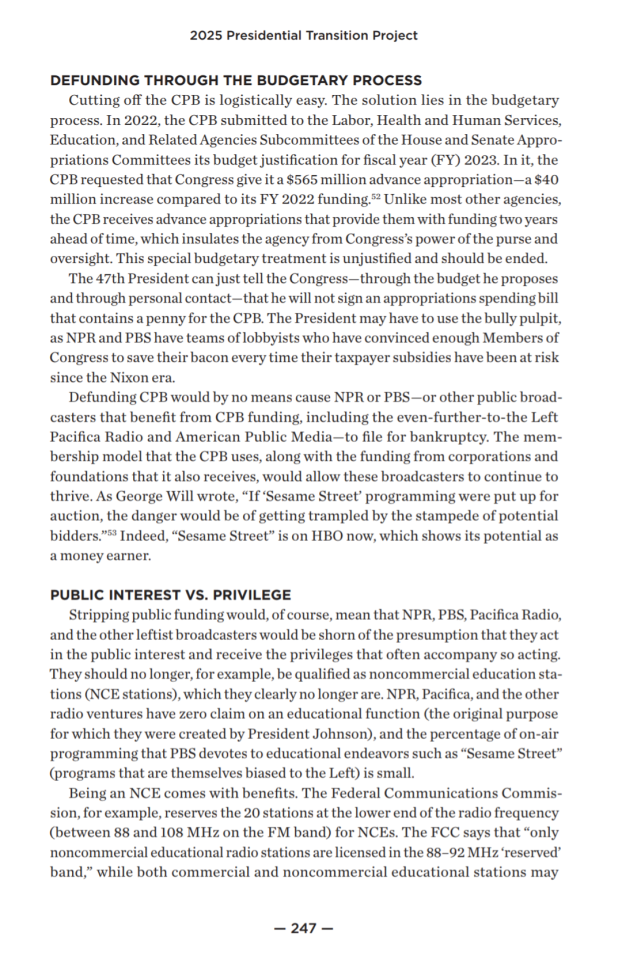
201 notes
·
View notes
Text
A lot of radio stations have gone away in my part of the world. Corporate greedheads decided that they're just too expensive to operate, so they shut 'em down. Nobody was left to leave by then, though. DJs in distant castles were running four, maybe five "morning zoo" programs at once. Harried technicians were on contract. The offices sat empty, unlocked, and available.
The first inkling we received that something had gone wrong was an ill-advised radio broadcast. Across the city, a bunch of auto-tuning FM radio receivers trying to avoid commercials latched onto the old, dead frequency, now very much alive. Alive with what? Alive with the sound of the microphone on a local DJ's vacant desk, left open to the elements while a magpie and a seagull fought over the decades-old remnants of the sandwich he was eating at the precise moment he was fired.
Somehow, through some trick of giga-corporate ultra-consolidation, they had simply forgotten to sell the offices to someone else. Maybe there was no one else who wanted a radio station. Soon, a community of weirds developed around the area. At first, it was just the usual kinds: poets, beatniks, scooter enthusiasts: people used to scuffles with the law and with, at best, a wilfully incomplete understanding of the law. We waited for them to get arrested, but it never came.
The cops didn't care. No corporation was screaming at them that their rights were being violated. The newspaper that would have bullied the Chief was part of the sweep of radio stations that died. More people followed into this great communal experiment, self-organizing themselves into a replica of the ancient radio schedules. Call-in shows. Top-40 pop music. Long discussions into the night about which recreational substances should be legalized. It was glorious, but then it ended.
Turns out that Uncle Ted's Copper Theft Hour got one of its guests a little bit too worked up, and he decided to do a live demonstration right in the studio. The transmitter was down for two weeks, until someone could steal enough metal from Home Depot and an overturned self-driving drycleaning van to bring it back to life. By then, though, the passion had gone out of it. All the weirds, now unable to force their opinions on others without response, had scattered to the four winds, starting lawn care businesses and mimeographing crank newsletters at the public library.
It was the end of an era, but I don't regret anything about it. I got like seven dollars in wire out of that place, which was enough to buy a working stereo from the Pick N Pull so I could listen to the show.
149 notes
·
View notes
Text
Not only is CBC/Radio-Canada's editorial independence guaranteed under Canada's Broadcasting Act, but our journalism is subject to rigorous standards, to which we're held publicly accountable through an independent Ombudsman office.
That is why the CBC objects to how Twitter has defined and applied the label of "government-funded media" to CBC's main corporate account — and to other public media organizations around the world over the past week.
It is why we have paused Twitter activity on our news and information accounts, mirroring a simultaneous halt to Twitter activity across CBC entertainment, sports, communications, corporate and Radio-Canada accounts.
Full article
Tagging: @politicsofcanada
CBC is up in arms about being labelled government-funded media when it is quite literally government-funded media. Frankly, colonist media sources hate having this label applied to them but demand that media sources from other (non-rich and/or non-white) countries that they deem inferior be assigned this label. You can't have it both ways, either apply it to all government funded media or none at all.
CBC acts like they're above being called government funded media and it's honestly just a colonial sense of superiority. The label doesn't even claim or imply that they're corrupt! It's a statement of fact that they recieve government funding!
I have no love for Twitter but this just shouldn't be a big deal.
(commentary by Samira, @politicsofcanada)
#cdnpoli#canadian politics#canadian news#canadian#canada#CBC#radio-canada#twitter#journalism#media#government funded media#state funded media
725 notes
·
View notes
Text
Internet politics have been shaped by a cyberlibertarian framing best exemplified by the writings of Electronic Frontier Foundation cofounder John Perry Barlow, whose Declaration of the Independence of Cyberspace became a key statement of principles for digital activists. His manifesto targeted its ire at governments, telling them, “You have no sovereignty where we gather.” He made no mention of the harmful influence corporations could have on online spaces, which was a reflection of Barlow’s personal politics. He was not only a speechwriter for Dick Cheney in the 1970s, but the Declaration itself was published at the World Economic Forum in Davos, Switzerland in 1996.
This cyberlibertarian framing of digital politics and its focus on speech over political economy has proved beneficial for tech companies for many years. As US tech firms went global, digital activists frequently opposed government efforts to regulate or restrict tech platforms as threats to their citizens’ digital rights and freedom of expression, largely ignoring the economic impacts of US economic imperialism in those countries. In the process, US companies were able to dominate international markets and few countries were able to establish the necessary economic protections to develop serious competitors to the American giants.
In countries like China, where protections were effectively implemented, digital and human rights groups rarely paid any mind to the economic component of those policies; they were narrowly positioned as censorship measures. The Great Firewall is used to restrict what Chinese internet users can access and post online, but it is also an economic measure. China protected its tech sector in a similar way that Japan and South Korea protected their automotive and electronics industries in decades past, spawning globally competitive, export-oriented companies like Toyota and Samsung. China’s Great Firewall allowed it to do the same, creating serious competition for Silicon Valley that would have never happened without economic protectionism.
Digital rights activism served the global ambitions of the tech monopolies forming in Silicon Valley and Greater Seattle by positioning attempts at restricting platforms and making companies abide by local rules and norms appear as overbearing government intrusions on people’s rights. In the cyberlibertarian framing, government — not corporations — are the enemy, and that was reflected in the way many activists long approached tech policy. It certainly doesn’t seem like a coincidence that it also served US commercial and geopolitical ambitions. Where countries previously placed ownership restrictions on its media and telecommunications sectors and invested in public broadcasters, that was all out the window with the internet. Foreign governments were expected to accept the dominance of US firms, or else be accused of breaching their citizens’ rights.
6 September 2024
29 notes
·
View notes
Note
What does vox's fans think of alastor? There together so often I could see them viewing alastor as an extension of vox or someone blessed by him
Anon asked: I know Vox is uber famous but I’d like to believe Alastor is famous in his own right too. The time period this is set in radio was still a popular medium. Does he have any fans? Ever get recognized from his voice?
I'm going to put these together because they kinda touch on the same things:
Alastor isn't unknown to people. His radio station is quite popular! His voice is iconic. Even if you don't know him, you know his voice. But his fame is more regional than Vox. Generally, in the USA, you've may have heard or know of him, but outside the country, probably not. His radio station isn't one of the huge corporation ones, so he's never 'swam in the same waters' as Vox before they met. He's not rubbing elbows with the president and the like. Vox is so big his name is out the door and around the world.
Also, Al was also never one for being photographed. Most people didn't know what he looked like before he started hanging out with Vox and going to red carpet events. So, nobody would ooogle over him like they do with Vox, at least until they heard him speak. Then people would flip out.
Public view of Alastor varies from fan to fan. Some people (especially in world of fame and personalities) are sooooo jealous of Alastor for having Vox as a 'best friend'. Some people actually got introduced to Alastor's broadcasts through Vox, and so they've always been a pair in their minds. There are...others that were more than a little critical because of how Al looked, but Vox doesn't care. And because Vox doesn't care, that means most of the public doesn't care.
But the general public view? They think Alastor is a cutie pie, a much more quiet personality compared to Vox, big momma's boy, and camera shy. They think the two of them are absolutely the cutest, nicest pair of friends to ever grace the public eye.
TLDR: Vox is more famous, but Al has plenty of fans. He gets recognized for his voice all the time. The public thinks he's adorable, especially when paired with Vox. :)
Thanks for the asks!
25 notes
·
View notes
Text
When the ABC (Australian Broadcasting Corporation) deceive the public, here is the real story from the farmer.
Mainstream media propaganda current affairs show 'The 730 Report' interviewed this farmer about his concerns of 'renewable' energy Wind Farms in the Central West of NSW.
This is what they didn't put to air, the real story.
* Each wind turbine has 2000 tonnes of concrete in its base.
* Each wind turbine has 600 tonnes of steel in its tower (not including the reinforced steel in the concrete base).
* Each wind turbine blade contains unknown amount of carbon fibre and epoxy and coated in Bisphenol A (BPA) which is extremely toxic to humans, animals and the environment, and degrades over time, leaching into the surrounding areas.
* These wind turbines produce unknown effects on stock fertility.
* These wind turbines are an impediment to food production.
* These wind turbines produce bugger all power.
* Twiggy Forest (mining "doctor") is involved, as always.
* Any compensation to farmers is minimal and does not come anywhere near helping the situation.
* Concerns for future generations.
28 notes
·
View notes